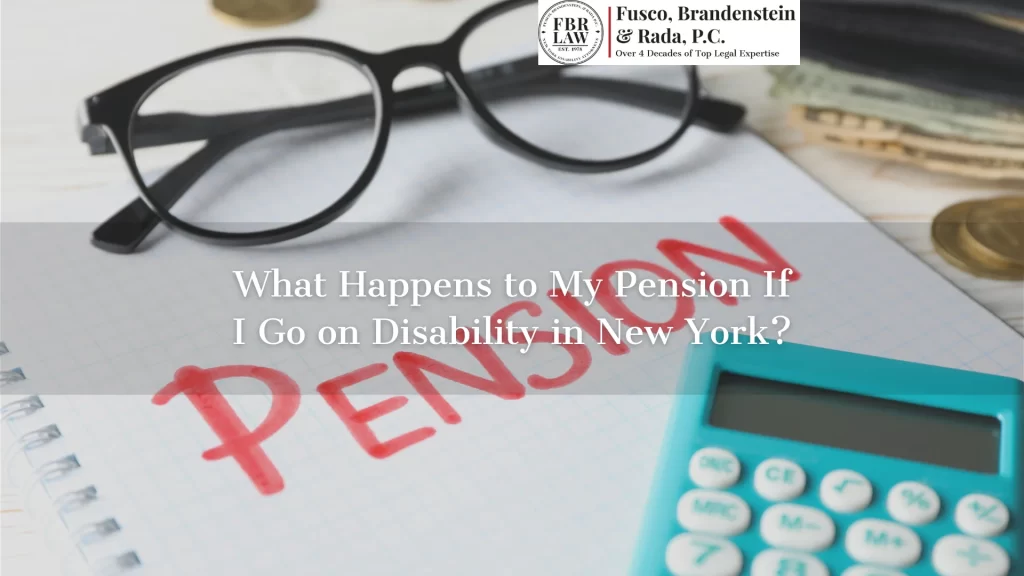
When you’ve worked hard all your life in New York and saved for retirement, unexpected challenges like a disabling injury or illness can raise many questions. For many New Yorkers, one of the biggest concerns involves their pensions. How do they work with disability benefits? Can you get both at the same time? Here’s what happens to your pension if you go on disability in New York: a guide on how disability benefits interact with pension payments in the state.
What Is a Pension?
A pension is a type of savings plan where you, and sometimes your employer, put money into an account during your working years. This money is saved for you to use in retirement. When you retire, you get payments from this account, usually every month, even though you’re not working anymore.
In New York, numerous laws and rules decide how pensions work and when you can get money from them. If you go on disability, it can change how you receive or use this money before retirement age.
What Are Disability Benefits?
Federal disability benefits are payments the government provides to people who cannot work because of a disability. In the United States, there are two main types of federal disability benefits: Social Security Disability Insurance (SSDI) and Supplemental Security Income (SSI):
- Social Security Disability Insurance (SSDI): These insurance benefits are for people who have worked and paid into Social Security but now can’t work due to a disability. The amount of money you get depends on how much you earned and paid into Social Security. To qualify, you must have worked a certain number of years and have a medical condition that meets Social Security’s definition of disability.
- Supplemental Security Income (SSI): SSI benefits help disabled individuals, as well as older adults and blind people, who have little to no income and few assets. It provides cash to meet basic food, clothing, and shelter needs. Unlike SSDI, SSI doesn’t depend on your work history. However, your income and assets must be below a certain level to qualify.
Can You Collect Retirement and Disability Benefits at the Same Time?
Yes, you can collect both retirement and disability benefits at the same time in New York. However, there are some important details you should know about the following types of benefits:
- Federal Disability Benefits: If you receive SSDI or SSI payments and also qualify for a pension, you could get both. However, the Social Security Administration (SSA) might reduce your disability benefits to offset the amount you receive in disability retirement benefits.
- Public Employee Pensions: In New York, if you worked for the state, city, or another public agency and receive a pension, you can also get SSDI without any reduction in your benefits. However, a public pension could affect your SSI benefits because of the income restrictions.
- Private Pensions: If you have a private pension from a job where you paid Social Security taxes, it shouldn’t affect your SSDI or SSI benefits.
Remember, you must report all changes in your income, including pension payments, to the SSA. This ensures you receive the right amount of benefits and avoid potential issues later on. If you’re unsure how a pension might affect your disability benefits, contact a knowledgeable lawyer for guidance.
Long-Term Disability vs SSDI/SSI
 Each of the following types of benefits serves a distinct purpose, and in some cases, receiving one type can affect another:
Each of the following types of benefits serves a distinct purpose, and in some cases, receiving one type can affect another:
- Pensions and SSDI: Receiving a pension might affect SSDI benefits if the pension comes from work that did not require you to pay Social Security taxes. However, if you earned your pension from jobs that did involve these taxes, your SSDI benefits usually remain unaffected.
- Pensions and SSI: Unlike SSDI, SSI is not dependent on your work history. But if you start receiving pension payments, it could increase your overall income, possibly reducing your SSI benefits or making you ineligible for SSI altogether.
- Pensions and Long-Term Disability: Long-term disability insurance is a type of private insurance that provides a portion of your income if you become disabled and can’t work for an extended period. If you’re getting benefits from a long-term disability policy and also receive a pension, the disability payment you receive might decrease. This reduction is because many disability policies consider other sources of income when calculating benefit amounts.
Contact Our Lawyers for Denied Disability Pension Claims
Still have questions about what happens to your pension if you go on disability? Let the New York disability attorneys of Fusco, Brandenstein & Rada, P.C. provide the answers you need. We pride ourselves on our deep knowledge in this area, and our dedicated team is passionate about helping individuals like you find clarity.
Call us now at 516-496-0400 to learn more in a confidential consultation session.
Related Reading:
